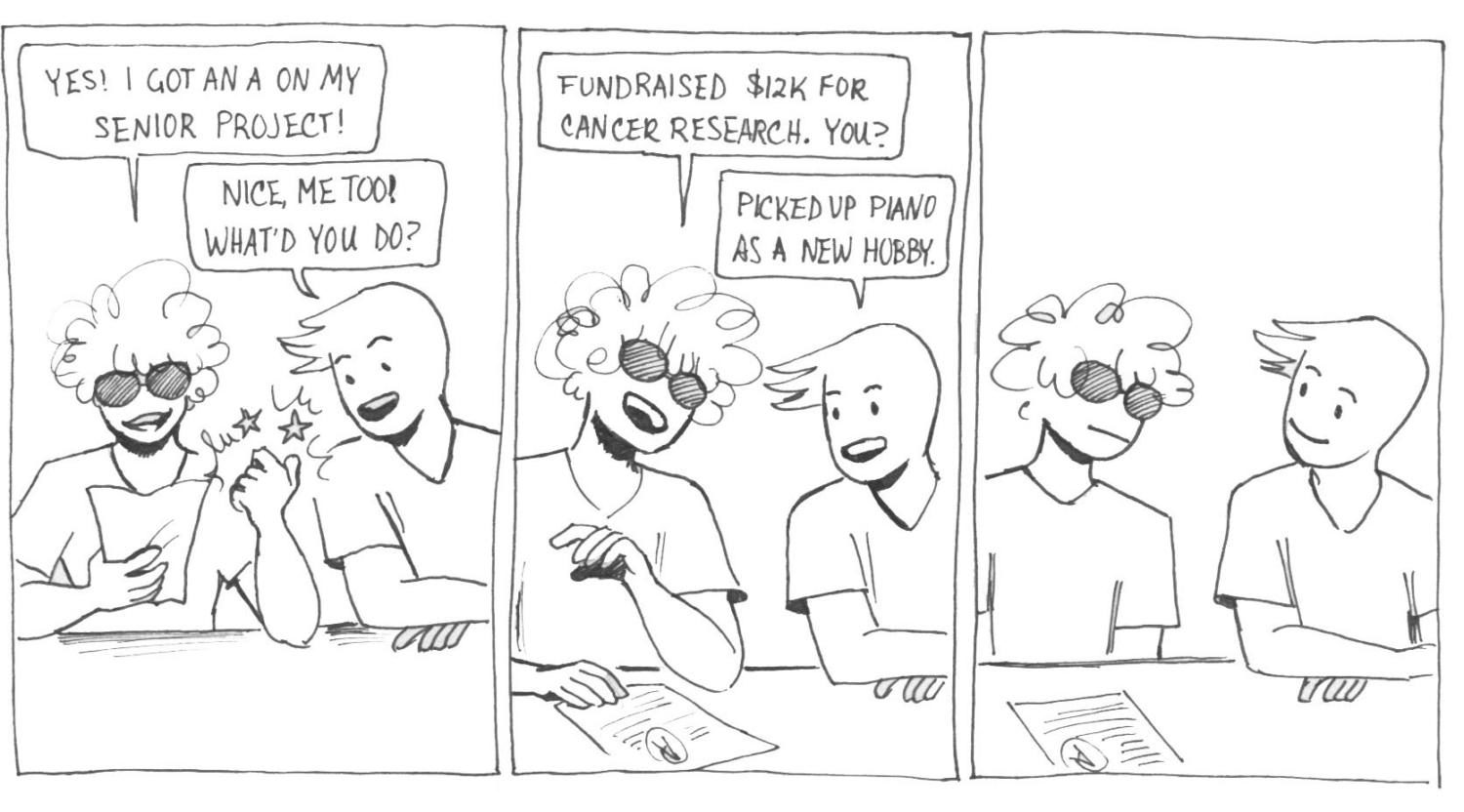Senior Projects: Should they stay or should they go?
While community service is necessary in order to graduate, communication and consistency regarding the structure of the Senior Projects has broken down over the years. Where students once had an advisor to work with and classtime dedicated to developing their ideas, this year’s process has seen fewer teachers offering help to students, confusion between clusters, and fluctuating due dates. We asked some members of the senior class for their opinion on the Senior Projects and quoted them below.
Photo by Jessica Tang
8,000 hours: Senior Projects benefit the community
By Principal Eric Backman
At our school, we strive to prepare all of our students to be successful. We want all of our graduates to be complex thinkers and problem-solvers. We want them to be prepared for 21st century global citizenship. We want them to be highly effective communicators and collaborators. And of course, we want all graduates to have a positive sense of self-worth, a healthy outlook on life, a sense of purpose and belonging and to enjoy meaningful friendships, family and community connections.
One of the most powerful educational experiences that the school provides its students is the Senior Project, a capstone, yearlong project that every senior completes. The interdisciplinary project challenges students in myriad ways, requiring them to complete at least 20 hours of community service, build a website to document their project, engage in research, work directly with an adult mentor, and give a public presentation to a panel of community judges. The project, perhaps more than any other assignment students complete in high school, gives them the opportunity to truly engage in real-world learning, which requires goal-setting, flexibility, risk-taking, false starts and perseverance –– skills necessary for success after high school in post-secondary education, the workplace and in the civic arena. Senior Project gives students the opportunity to set out and complete a challenging task that has tangible results in the real world.
Last year, seniors completed a number of truly exceptional projects, which include: Project Vincero, a memorial for James Forni; volunteer work at Santa Rosa Memorial Hospital; childcare support at La Tercera; a 5K run for childhood cancer research; mountain bike trail building at Helen Putnam Park; volunteering at the Soup Kitchen at the Mary Isaak Center; house building in Mexico; and supporting Sonoma County’s Bookmobile to promote literacy.
Seniors from the class of 2017 are in the process of completing projects that are equally as impressive. Seniors have reached out to students at Cypress School, a great story recently covered in the Argus Courier. They have worked to educate the community about transgender identities and gender equality. Seniors are building new benches for the library garden and for the James Forni Memorial Walkway. They are painting beautiful murals for campus beautification and performing music for the elderly. They are mentoring and coaching younger students at elementary schools throughout Petaluma. They are volunteering at local hospitals, COTS, the animal shelter, Point Reyes National Seashore, Giant Steps, and for Friends of the Petaluma River. The list goes on and on.
With nearly 400 seniors, seniors from the class of 2017 will complete over 8,000 hours of community service, giving back to the Petaluma community in truly meaningful ways. Volunteer service like this provides our students with relevant and meaningful learning experiences that go far beyond traditional academics. Ideally, by completing the Senior Project, students will learn that they are capable and empowered and can make a real difference in the world around them. These are goals that every school should be committed to.
Senior projects are a good idea to force seniors into doing community service and volnteering, but in my opinion they are overall a waste of time with the presentation and the website. I understand the want for volunteers but a ten minute presentation about it seems unnecessary.
— John Llavaerias
Personally, I think that Senior Project is important. It adds to a lot of community service in Petaluma and it’s my opinion that seniors need to be more involved anyways. I think it’s good that we force them to get out and be active.
— Aaron DuBois
As great as some of the Senior Projects are, I personally wish they were not a requirement. As a senior taking six classes, four of them being AP, playing a varsity sport, having a job, being in Honors Society, and being president of a volunteer community service club already, trying to fit in a really good Senior Project on top of that has been extremely difficult. I see how valuable they are and can be, but I have a hard time supporting the continuation of them because I know there are a lot of circumstances like mine that make them very difficult.
— Lexie Andrade
I think the Senior Project is a great opportunity to connect with the community –– whether it be a larger community or even the school community. I understand that it is difficult for the majority of seniors to undertake such a project on top of busy schedules, but it’s a great way to give back.
— Danielle Rebullida
Senior Projects lack structure and cohesion
While the concept behind Senior Projects is admirable, the execution is riddled with inconsistencies in terms of due dates and expectations and results in mediocre projects and stressed-out students. Most agree that the community service aspect is important, but the rest of the project, including the websites and process, leaves many seniors frustrated or overwhelmed
It’s a given that community service is something every student should partake in, but forcing seniors to do volunteer work results in half-hearted, lackluster projects that aren’t deserving of a passing grade. This leads to situations in which a student teaching elementary school children how to brush their teeth gets the same recognition as students who actually fulfilled their 20 hours and tutored younger students or helped fundraise for programs for children with disabilities. Many Senior Projects show a serious lack of time or committment because the students who completed them were uninspired and uninterested in their community service.
Finding the time to complete the project can be a struggle as well, as they try to keep up with classes, work, extracurriculars, sports, and college and scholarship applications, leading some to suggest making this project a junior requirement rather than a senior one. This not only reduces additional stress for senior year, but it also gives students who fail to complete it their junior year another year to finish it, increasing the likelihood that they’ll graduate. College applications and preparing for AP tests consume a great deal of time, so moving the project to junior year could potentially allow for less mediocre projects and more thought-out, impactful community service. Even just getting students to start thinking about their projects at the end of junior year could ensure more motivated students and projects.
But even for those who are on top of things, arbitrary due dates and disparities between clusters cause confusion and unnecessary stress. For example, the conflicting information surrounding the most recent due date for Senior Projects made it difficult for teachers to grade students across different clusters fairly, as requirements varied from cluster to cluster and even from teacher to teacher. Some required a blog page while others didn’t, and some teachers assured their students that their presentations didn’t need to be finished, when it was actually a criteria the websites were being graded on. Check-ins are not necessarily a bad thing, but having teachers grade half-completed projects a month before the due date seems pointless and just created more work and stress for teachers and students alike. A better method might be having individual teachers review websites of their classes so that this confusion and inconsistency can be eliminated.
While the idea behind Senior Projects is a good one, their execution should be smoothed and greatly improved in terms of cohesion, expectations, and time frame. Moving the project to junior year would do a lot to remedy many of the issues students have with Senior Projects, but if that’s not possible, the best thing would be to resolve the chaos and ambiguity surrounding many due dates and requirement and even try to find a way to motivate students to find a project they’re passionate about.




